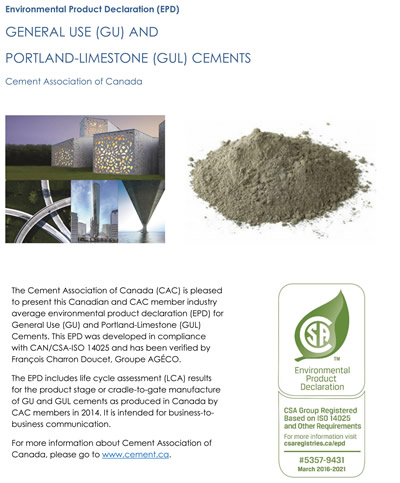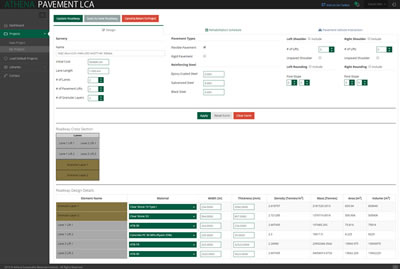Along with member producers and downstream partners, the Cement Association of Canada has released Concrete Zero, an action plan for carbon emissions reduction measures up and down the industry’s value chain. The document builds on formal CO2 benchmarks that CAC and Innovation, Science and Economic Development Canada officials outlined last fall in Roadmap to Net-Zero Carbon Concrete by 2050. To…
Read MoreTag: Cement Association of Canada
Cement Association of Canada delivers Concrete Zero
Sources: Cement Association of Canada, Ottawa; CP staff Along with member producers and downstream partners, the Cement Association of Canada has released Concrete Zero, an action plan for carbon emissions reduction measures up and down the industry’s value chain. The document builds on formal CO2 benchmarks that CAC and Innovation, Science and Economic Development Canada officials outlined last fall in Roadmap…
Read MoreMANUFACTURERS – FEBRUARY 2020
Montreal-based McInnis Cement has appointed Baudouin Nizet as president and chief executive officer, succeeding Jean Moreau, who has held the posts in an interim capacity since 2018. Nizet’s tenure in cement includes tours of duty in Montreal as Holcim (Canada) senior vice president, Quebec and Atlantic Region, 2006-2013; and Toronto as president and chief executive officer, 2013-2017, spanning the migration to CRH Canada Group. He has also served as Cement Association of Canada and Canada Green Building Council director.
Read MoreReport chips away at wood industry’s low carbon building narrative
Sources: International Institute for Sustainable Development, Winnipeg, Manitoba; CP staff
A Cement Association of Canada-funded report exposes the limitations of life cycle assessment (LCA) studies whose results have thus far painted a more favorable greenhouse gas (GHG) emissions profile of wood versus concrete or steel buildings. As the main tools to measure building products’ carbon footprints at the production, use and end of life phases, LCA studies as presently executed can exaggerate the importance of embodied GHG impacts when they discount or ignore other significant life-cycle emissions, according to “Emission Omissions: Carbon accounting gaps in the built environment.”
Read MoreLife cycle auditor Athena revises pavement software program
Sources: Athena Sustainable Materials Institute, Ottawa; CP staff
The Athena Pavement LCA Web App has been updated to further simplify life cycle assessment (LCA) and make paving more environmentally sustainable and cost effective. Version 3.1 reflects plant process data based on the National Ready Mixed Concrete Association 2016 industry average LCA and Environmental Product Declaration for concrete, along with these companion improvements:
Read MoreCement Canada EPD covers standard, portland-limestone cements
Toronto-based standards development, testing and certification services provider CSA Group has registered its first Environmental Product Declaration: “General Use (GU) and Portland-Limestone (GUL) Cements.” The document references (Canadian Standards Association) CSA A3001 product, mirroring ASTM C150 and C1157 plus AASHTO M85 standards, and reflects an industry average of Product stage or cradle-to-gate data from six Cement Association of Canada (CAC) producer members.
Industry Pushes Back on Code Dodging Friendly for Taller Wood Buildings
The Cement Association of Canada (CAC) is questioning the Quebec government’s decision to bypass the usual building code development process by allowing construction of taller (more than five stories) wood buildings on the basis of a guide developed by the Régie du bâtiment du Québec and FPInnovations, a private research center dedicated to supporting the Canadian forest industry.
Construction life cycle assessment pioneer retools Buildings, Pavement programs
The developer of a life cycle assessment (LCA) tool informing ready mixed and manufactured-concrete interests’ product category rules (PCR) and environmental product declarations (EPD) has released Impact Estimator for Buildings Version 5.1 and Pavement LCA Version 2.1, both programs available as free downloads. Athena Sustainable Materials Institute, Ottawa, revised the software with support of Cement Association of Canada, National Ready Mixed Concrete Association, Portland Cement Association and Slag Cement Association (SCA), plus input from the NRMCA- and PCA-chartered Concrete Sustainability Hub at Massachusetts Institute of Technology (CSHub).
Industry pushes back on code sidestepping friendly to taller wood buildings
Sources: Cement Association of Canada (CAC), Ottawa; CP staff
Cement and concrete interests are questioning the Quebec government’s decision to bypass the usual building code development process by allowing construction of taller (> five stories) wood buildings on the basis of a guide developed by the Régie du bâtiment du Québec and FPInnovations, a private research center dedicated to supporting the Canadian forest industry.
Read More


